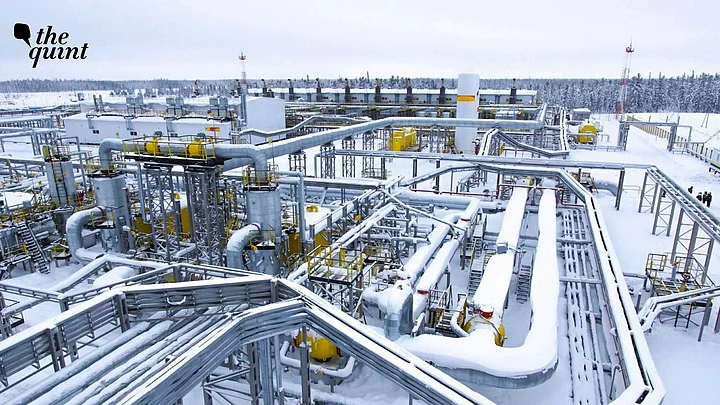More than two months into the invasion of Ukraine, the gas threat has officially been employed by Russia.
In retaliation against western sanctions, Russia, on 27 April, stopped gas supplies to Bulgaria and Poland for rejecting the former's demand to settle payments in Roubles, Reuters reported.
The state-owned energy company Gazprom confirmed the same in a statement that read, "Gazprom has completely suspended gas supplies to Bulgargaz and PGNiG due to absence of payments in roubles."
Bulgargaz is the biggest natural gas distribution company in Bulgaria, while PGNiG is a Polish state-controlled oil and gas company.
European Commission President Ursula von der Leyen labelled the move "unjustified and unacceptable."
"Gazprom's announcement is another attempt by Russia to blackmail us with gas," she added in a statement on Twitter.
Some Basic Numbers
Poland imports 10 billion cubic metres (bcm) of gas a year and Bulgaria annually imports around 3 bcm of gas.
According to EU data, the former buys more than 45 percent of its natural gas from Russia, while the latter buys just less than 80 percent.
The Polish government has stated the country's gas stores are 76 percent full and there is no need, as of now, to use those reserves.
Bulgaria claims to have enough gas for a month, with the reserves being 17 percent full.
Altogether, the gas imports of Poland and Bulgaria from Russia account for just about 8 percent of total EU imports.
Aound 60 percent of the EU's energy requirements are imported, with Russia being the main exporter.
The EU's energy stocks are only at 33 percent storage capacity, and the European Commission has urged member states to ensure that their capacities are at 80 percent by November.
Why Did Russia Cut Off Supplies?
Both Poland and Bulgaria are apparently being penalised for not giving into Russia's demand for gas payments in roubles.
The demand comes in the backdrop of western sanctions crippling the Russian economy. Payments in roubles would provide a much-needed boost to the country's finance.
Other EU nations have also refused to pay in Roubles, but they are yet to be penalised.
Moscow does not want payments in euros or dollars, because those would simply get added to Russia's foreign currency reserves.
Both euros and dollars have been frozen since the beginning of the invasion due to western sanctions.
Why Poland & Bulgaria?
The motive seems to be two-fold.
On one hand, the restrictions in gas supply will cause intense insecurity to the people of Poland and Bulgaria.
On the other hand, as a natural consequence of people's insecurity, the cut in supply is expected to create insecurity within the political elite of both countries, and sow divisions that will aim to reverse the support for Ukraine provided by both countries.
Vladimir Putin may also be thinking that it will also create disunity within a greatly united NATO and EU.
Alternate Options
Poland can use alternative routes, two of them, with Germany, and an interconnector with the Czech Republic that can supply an additional 1.5 bcm of gas annually.
Three other gas links are set to open for Poland this year: the Gas Interconnection Poland–Lithuania with an annual capacity of 2.5 bcm (on 1 May), the Polish-Slovak gas Interconnector with an annual capacity of 5-6 bcm later in the year, and a 10 bcm pipeline with Norway known as The Baltic Pipe.
In the case of Bulgaria, it could choose to import gas from Greece and Turkey, including LNG (liquefied natural gas).
Tapping into common EU gas purchases is also an option, according to the Bulgarian energy minister.
The construction of the Gas Interconnector Greece-Bulgaria is set to be complete in June later this year, which will ensure that Bulgaria can annually import about 1 bcm of gas from Azerbaijan.
What About the Rest of EU
European leaders, including the European Commission president, Ursula von der Leyen, have clearly said that they will not succumb to Putin's blackmail.
Additionally, EU officials confirmed earlier this week that any energy company agreeing to open a rouble account in Russia and pay for gas in Russian currency would be violating the collective western sanctions that have been slapped on Moscow.
Is There Another Way?
The decree from the Kremlin, however, decree 172 on Russian gas purchases in roubles, does not prohibit importing countries to ask Gazprom to render the energy purchase as legally complete only after the first payment is done in euros or dollars.
The conversion into roubles would take place after the first transaction, meaning that the energy companies from the EU would not technically have violated sanctions.
That is the loophole that decree 172 has provided to European buyers like the Austrian oil company OMV and the German energy company Uniper.
A new payment system is in place for buyers that requires the opening of two accounts at Gazprombank.
Euros and dollars would be paid into one account before being converted by the bank into Roubles, and then they would be sent into the second account.
From the second amount, the money would go to Gazprom. Without this process, the buyer would not have fulfilled its legal obligation to pay for Russian gas.
